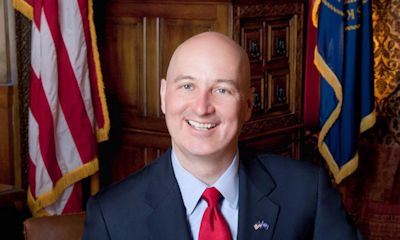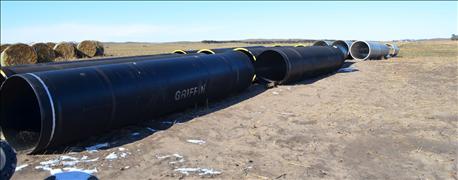
This is the second article in a two part series on augmentation projects on Republican River
There are detractors for two Republican River augmentation projects including the Rock Creek augmentation project in Dundy County and the Nebraska Cooperative Republican Platte Enhancement project in Lincoln County. This was evidenced by testimony at a recent hearing on NCORPE held in North Platte.
These projects increase stream flow and take some irrigated land out of production. Irrigation well water on those formerly irrigated properties is then pumped into the river or a tributary of the river, to increase stream flow into Kansas and satisfy Republican River Compact requirements for Nebraska.

READY FOR INSTALLATION: This photo is of the 42-inch pipes used at the NCORPE project taken just before they were installed in late 2013. Photo courtesy of Upper Republican NRD.
Upper Republican NRD assistant manager, Nate Jenkins, responded to some of the primary concerns, saying, "Both of the projects were designed to provide an offset, via retirement of irrigated acres, sufficient to ensure that the amounts of augmentation water pumped long term will be close to the same amount that would have been pumped had the project lands remained irrigated," Jenkins said. "This was done in part to protect neighboring wells and the local groundwater aquifer."
The big question from some stakeholders relates to the volumes of augmentation water pumped. "While more augmentation water may be pumped in one year than would have been pumped for irrigation on the project lands in the same year, there will be years when the projects aren't used at all, or minimally," Jenkins responded. For instance, if the projects had been in place years earlier, neither of them would have been used in any of the years 2007 to 2012, he said.
Observers have also asked about the impact on groundwater levels. "Declines in groundwater levels from 2013, before NCORPE began being used to fall of 2015 at the NCORPE project were less than the average decline of groundwater wells outside the project, but in the general area during the same time period," said Jenkins.
Without the augmentation projects, it is difficult to figure what the negative impacts would have been in the Basin moving forward. In a recently decided lawsuit, Kansas sought approximately $70 million in damages from Nebraska and permanent shutdown of irrigation on approximately half of all irrigated acres in Nebraska's portion of the Basin. Instead, Kansas was awarded $5.5 million and no permanent shutdown of irrigation was ordered.
Beyond the augmentation projects, the only other way for the state to comply with the Compact would be a 60% reduction in water allocations for all irrigators. This would be in place every year, or there would be largescale irrigation shutdowns in years when action was needed to maintain compliance, Jenkins explained.
"Incremental decreases in water use will not ensure compliance," he said, adding that reducing water use has always been, and will continue to be a goal of NRDs in the Basin. "The Republican Basin may be the largest and most heavily regulated region of agricultural water use in the country," he added. "All irrigation wells are metered and limitations on groundwater use are imposed on all groundwater irrigators."
Learn more about these projects in upcoming print articles in Nebraska Farmer. You can contact Jenkins at 308-882-5173.
About the Author(s)
You May Also Like






